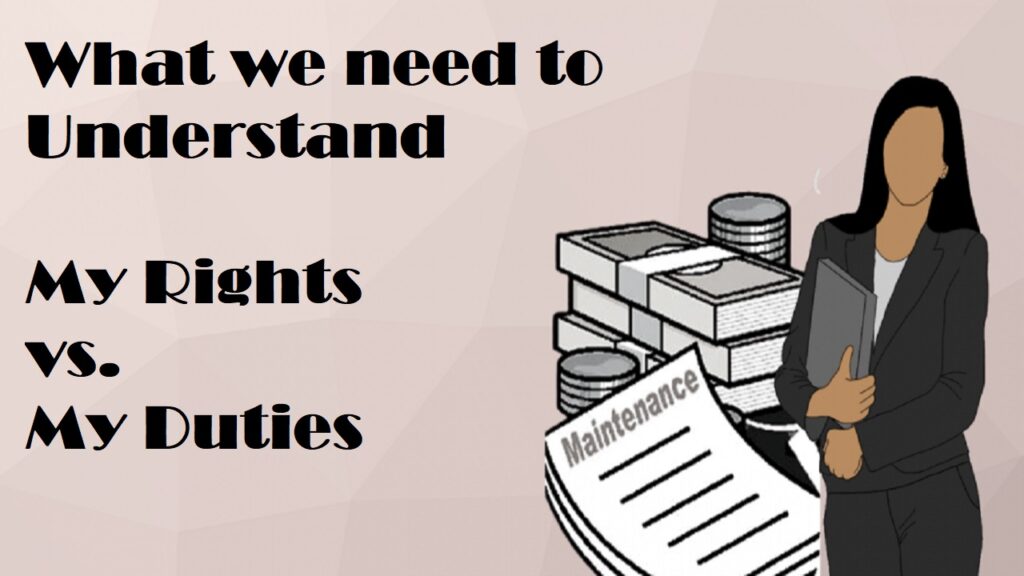Disclaimer
The primary intent of this blog is to disclose and discuss the situation at hand, without targeting or discussing specific individuals. It is important to note that the Court holds the final authority to decide the case, and our purpose is not to encroach upon or influence that authority in any way. We want to emphasize that our intentions are not to cause harm or insult to anyone involved in this situation. Our sole objective is to shed light on the matter and ensure that this situation is brought to the forefront, enabling you to gain a better understanding of WHY MEN LOSE.
I would like to share one of the cases I am currently handling, where I am representing the Respondent (husband). The Petitioner (wife) has filed a case for maintenance. To protect the privacy of the individuals involved, I will not be disclosing their real names, places, or identities. The main purpose of this blog is to present the situation at hand for consideration, focusing solely on the circumstances rather than specific individuals.
With that being said, let’s delve into the details of the situation.
Introduction
As most of us are aware, the Hon’ble Supreme Court’s landmark judgment in the case of “Rajnesh vs. Neha” established the requirement for both parties involved in a maintenance case to file their affidavits disclosing their income and assets. This mandate ensures transparency in such proceedings.
The present case involves a situation where the wife intentionally concealed her information from the aforementioned affidavit, causing a significant hurdle for the husband in contesting case without the necessary details. This has resulted in a challenging and arduous journey for the husband in his pursuit of obtaining the required information.
It is often unpredictable how a fight against an individual can escalate into a battle against the entire system, where even a victory in the end may yield fewer benefits than a defeat.
What happened?
In the present case, it is important to note that both the husband and wife were employed. However, when the wife initially filed a petition for maintenance against her husband, she deliberately concealed the fact of her own income. Subsequently, during the process of filing her affidavit, she admitted to being employed and provided details regarding her work and salary.
However, it is worth mentioning that she continued to evade the submission of her bank statements, Income Tax Returns, and various other crucial details. This behavior raised suspicions that she intended to conceal her actual income, as her employment involved a sales job where incentives or commissions from sales were not included in her regular salary.
Legal remedy
To address such situations, the procedure was outlined in the judgment titled “Rajnesh vs. Neha” itself, which clearly states the following:
If there is any dispute with respect to the declaration made in the Affidavit of Disclosure, the aggrieved party may seek permission of the Court to serve interrogatories, and seek production of relevant documents from the opposite party under Order XI of the CPC
Consequently, an application requesting the production of documents was filed before the relevant court, seeking bank account statements, Income Tax Returns, and other pertinent details.
What followed
Instead of complying with the legal requirement and submitting the requested documents as per the application, the wife decided to contest it by resorting to utterly false statements. As an example, the following is an excerpt from the wife’s reply:

Both of the aforementioned statements made by the wife are false, prompting the husband to file a rejoinder in response. The rejoinder highlights the following key points:

Regrettably, the Court disregarded the statements presented in the rejoinder and issued the subsequent order and observation:

The Court did not explicitly request or direct the wife to provide her SBI bank account details or issue a statement denying the existence of such an account, as highlighted in the rejoinder.
Moreover, it is important to note that the Court also observed that the wife had indeed submitted her Income Tax Return for the year 2022-23 as part of the proceedings.
And contrary to the wife’s acceptance of her employment, the Court proceeded to hold that she was indeed unemployed. However, it is crucial to note that the wife’s own affidavit explicitly states the following:

Could be our fault?
Both the husband and I began to assume that the wife may have indeed filed the necessary documents, and perhaps we were not provided with copies by the opposing counsel. Our assumption was based on the fact that not only did the wife explicitly state the filing of those documents in her reply, but the Court itself acknowledged the same in its order.
Upon conducting a file inspection, we discovered that there was nothing on record as well.
This revelation came as a shock to us, prompting us to apply for certified copies of the Income Tax Returns filed by the wife. Here is the report provided by the copying branch of the Court itself:

The copying branch was so appalled by the situation that they felt compelled to explicitly mention the name of the husband’s lawyer, confirming that the records mentioned in the Court order were not available in the file.
What is the remedy now?
From a legal perspective, the available recourse now is to file a revision before the Hon’ble High Court. The details that the wife should have been legally obliged to provide, which is the responsibility of the Family Court itself to ensure, came down to husband having to file a specific application for this purpose. Unfortunately, even after taking such measures, the husband’s efforts were not successful.
These situations often result in a permanent sense of defeat
Regardless of the consequences that one’s struggle may bring, against such situations. it is disheartening to realize that it ultimately results in a defeat from various perspectives. Here are a few reasons that contribute to considering it a defeat:
(Note: the points mentioned below do not particularly relate to this case, but similar situations)
- Upholding Justice: As previously mentioned, the wife should have been legally obligated to provide certain details, and it was the responsibility of the Family Court itself to ensure their submission. However, despite a specific request made for these details, the Family Court failed to fulfill its duty in ensuring their provision. This oversight further compounds the frustration and sense of defeat experienced by the husband in seeking a fair resolution to the matter.
- Emotional and Mental Toll: Even a seemingly small concern can escalate into a significant headache, compelling individuals to engage in yet another battle to secure something they were legally entitled to. It is disheartening to witness how such seemingly straightforward matters can spiral into complex and time-consuming struggles, further exacerbating the challenges faced by individuals seeking their rightful entitlements.
- Loss of Time and Resources: It is important to recognize that pursuing a revision is not only a costly endeavor but also a time-consuming process. The husband will inevitably bear the burden of both time and financial resources to assert his rights, which should have been ensured by the Family Court in the first place. Even if the husband emerges victorious in the revision, it cannot undo the losses and damages already suffered. This highlights the inherent limitations and shortcomings of the legal system, where rectifying past injustices often remains elusive.
- Inequality and Injustice: The behavior exhibited by the Courts in such cases, disregarding the safeguards provided by the law, signifies a profound sense of injustice and inequality in the treatment of individuals. Despite the existence of ample safeguards and legal provisions, the failure to uphold them erodes the trust and confidence in the legal system. Such instances highlight the urgent need for consistent and equitable application of the law to ensure fairness and justice for all parties involved.
- Diminished Faith in the System: Experiencing repeated setbacks and witnessing the limitations of the system can erode one’s faith and trust in its ability to deliver justice effectively.
These instances contribute to a growing trend where more and more men feel compelled to surrender to unjust and unfair demands from their wives. This perpetuates a culture where men are expected to compromise without putting up a fight to protect themselves from injustice. Such a situation reflects a widespread lack of trust in the law and the courts, as people increasingly perceive them as failing to deliver fair outcomes. It underscores the urgent need to restore faith in the legal system and ensure that all individuals, regardless of gender, are treated equitably and receive just resolutions to their disputes.
What is being done in this situation now?
Despite the challenges faced, all hope is not lost. Diligent efforts are being made to rectify the situation and seek a just resolution. The progress and outcomes of these efforts will be updated in this post, providing transparency and keeping readers informed about the developments. Even in the face of potential setbacks, the commitment to pursuing justice remains steadfast.
We sincerely hope to share this story in our “Success Stories” section, showcasing a favorable outcome without the need for a revision, thereby saving valuable time and resources for our client. However, it is important to acknowledge that this is not a pre-scripted event, and we cannot predict the exact outcomes with certainty. The process is dynamic, and the final result will be determined by various factors and legal considerations. We remain dedicated to pursuing the best possible resolution for our client and will provide updates accordingly.
Stay connected with us through our social media platforms to stay updated on the progress of this case. We encourage you to share your opinions and thoughts on the present situation and what course of action you would take if faced with a similar scenario. Feel free to share this story with someone you know who can relate to the challenges and experiences described here. Together, we can create a supportive community where experiences are shared, and valuable insights are exchanged.




